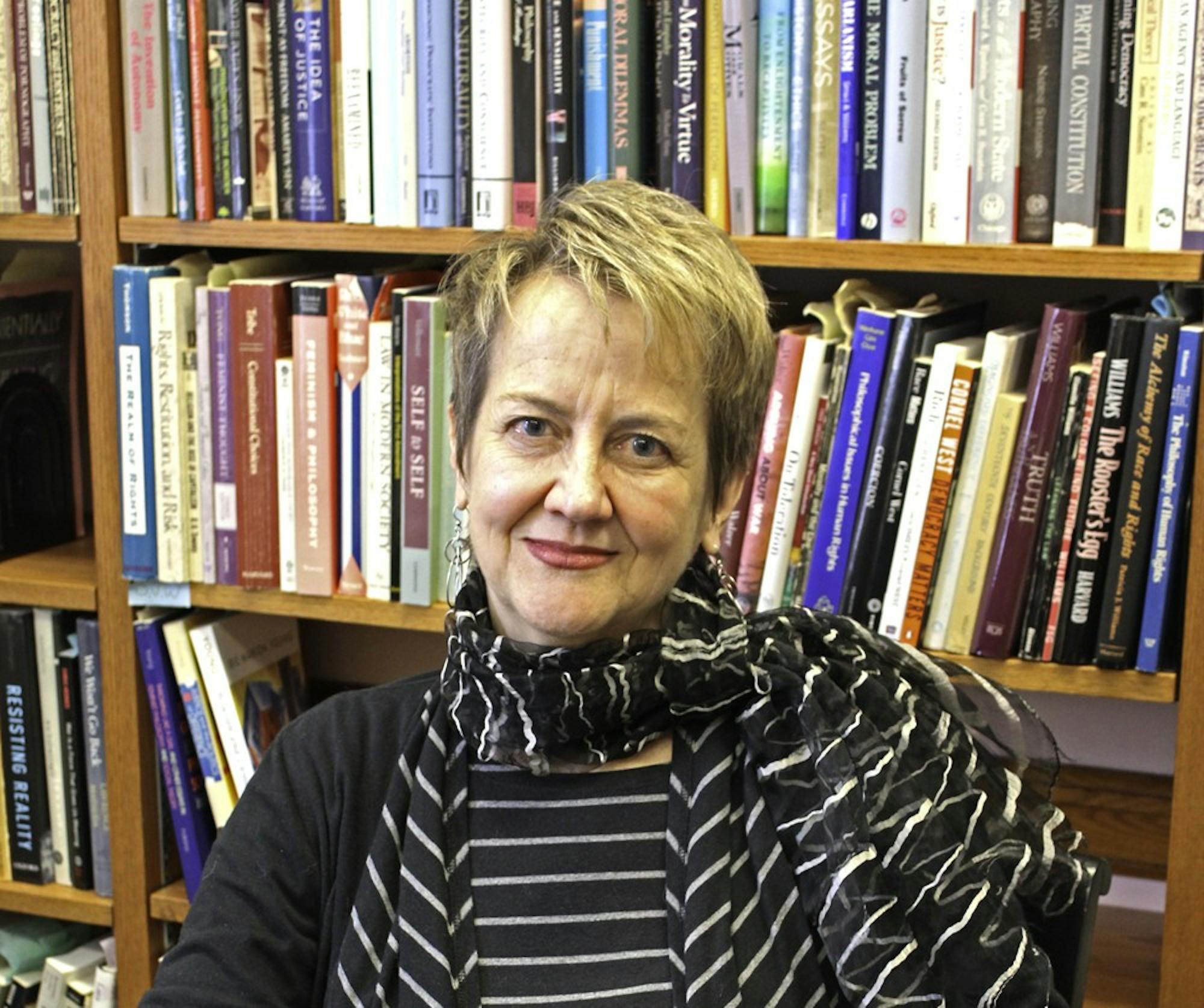Susan Brison, a philosophy professor and sexual assault activist, was told by an attorney to forget her assault. Instead, she focused her academic and activist work on combating sexual assault through writing both books and op-eds, public speaking and advocacy for violence against women.
Brison’s most recent op-ed “Why I Spoke Out About One Rape But Stayed Silent About Another,” published in Time magazine in December, describes two personal experiences of sexual assault. As part of her advocacy work, Brison lobbied for the Violence Against Women Act in 1994 and its re-authorization in subsequent years.
Her 2003 book “Aftermath: Violence and the Remaking of a Self” received wide acclaim for its emotionally and intellectually stimulating account of her own sexual assault and her subsequent journey as a survivor.
Brison said that writing was an essential form of activism for her and for advocates in general. The process of writing “de-stigmatizes” sexual assault by talking about it and raising awareness, she said.
“One of the most important things in anti-rape activism is to enable survivors of rape to speak and to make it possible for others to listen,” Brison said. “I think even just writing about one’s own experience or other survivors’ experiences is an essential part of doing something about the problem of rape.”
Brison said that she was partly inspired to write the book because of others’ reactions to her own assault. One instance in particular stood out to her.
“The Attorney General looked at me and said, ‘after the trial, you must forget that this ever happened,’” Brison said.
Brison said she considers her own experience, and sexual assault in general, to be a gender-based hate crime. She noted the importance of people recognizing the crime as a “political phenomenon” and a hate crime on par with bias crimes. Instead, people often view sexual assault “as something that happens as a fluke to unlucky individuals who should just forget about it after,” Brison said.
Brison is currently working on a book about the negative effects of certain types of pornography on the development of American adolescents. She said the book will examine how children are raised to view certain types of sexual relations and definitions of masculinity and femininity as normal or desirable.
“I’m concerned about that subset of pornography that is violently misogynistic,” Brison said. “It’s part of what many philosophers call the ‘cultural scaffolding’ of rape.”
The project combines Brison’s main academic interests in gender violence and free speech theory, she said.
The role of professors and faculty members in preventing campus rape is crucial, Brison said. The sheer number of Dartmouth faculty, including male faculty members, getting involved to stop sexual violence and aid victims is “encouraging,” she said.
“The problem of sexual assault on campus is a faculty issue — it affects students’ academic performance,” Brison said. “All of us have students who have been assaulted and cannot live up to their full potential as a result.”
Brison said that nationally, faculty members are beginning to do more work with students and administrators around this issue. Brison said that the “Moving Dartmouth Forward” proposals — particularly the climate survey, independent investigators and strengthened ties with the Upper Valley’s WISE program — are strong steps in the right direction.
She noted the importance of the Dartmouth Summit on Sexual Assault last July. Brison served on a panel of survivors during the conference.
Brison said that she was “thrilled” with College President Phil Hanlon’s residential communities plan because of its potential to foster communities with undergraduates and to provide opportunities for faculty and students to interact outside the classroom.
In her experience working as live-in faculty advisor for the East Wheelock cluster, Brison said that many upperclassmen students who wanted to live in the residential cluster said they felt unsafe in their old clusters.
“The stereotypical Dartmouth work-hard-play-hard ethos completely separates the life of the mind, the academic work and the social life, where you’re connecting with faculty and students and community members,” Brison said. “That’s just not healthy, it’s important for students to have a holistic view of college life.”
Brison noted that this was not a criticism of Dartmouth students or culture as a whole, but rather an unfortunate and easily avoidable phenomenon.
Psychology professor John Pfister worked as the East Wheelock dean while Brison was the cluster faculty advisor.
“Susan brought a true renaissance to East Wheelock,” Pfister said.
Pfister said that Brison brought interesting speakers and facilitated discussions and interactions between visiting artists and students and had a strong rapport with the students in the cluster. He noted that she is one of the “wisest” people he knows and considers her to be a “rejuvenating force.”
“She has a talent for bringing students into the fold and exposing them to something different than they’ve had before,” Pfister said.
History professor Annelise Orleck — who has worked with Brison for 24 years — said the two collaborated on a variety of campus projects pertaining to sexual assault and academic endeavors. She noted that Brison has helped many people by “chronicling her survival” and “finding a line between being a scholar and an activist.”
“She has been an absolutely courageous leader, role model and inspiring presence for many people, students and faculty alike,” Orleck said.




